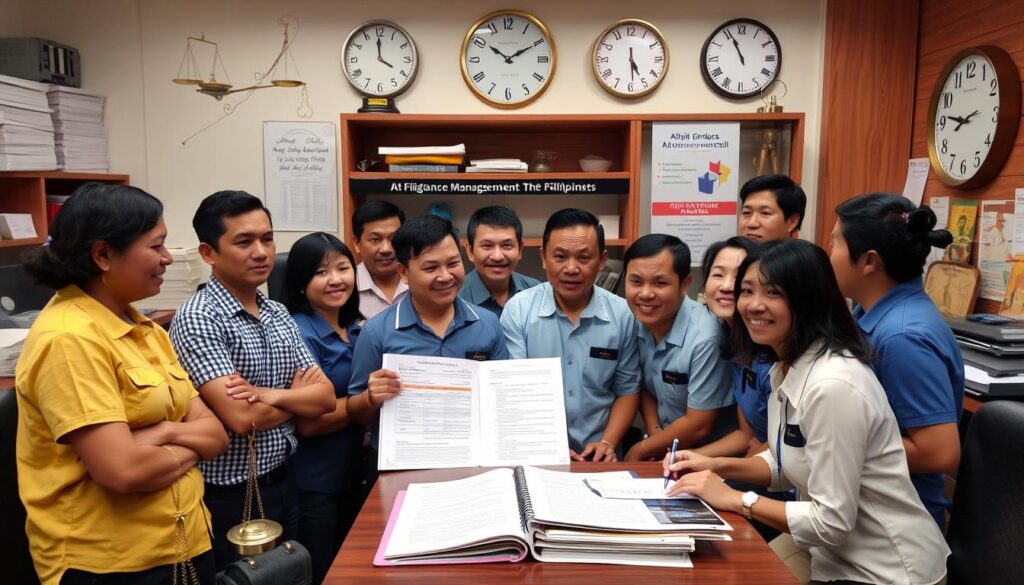Ever thought about how much a simple attendance record can affect your business? In the Philippines, DOLE compliance is key for running smoothly, not just for legal reasons. It’s about making sure everyone is treated fairly and respected at work.
Knowing Philippine labor laws and following DOLE compliance rules helps avoid legal trouble. It also makes your workplace better. Good attendance management means happy employees and better work done.
Getting to know how to manage attendance well is important. It helps make a great work place. Read on to learn how good attendance can change your business for the better.
Key Takeaways
- DOLE compliance is essential for safeguarding employee rights in attendance management.
- Adherence to Philippine labor laws promotes a fair and transparent workplace culture.
- Proper attendance records are vital for minimizing legal risks associated with employment.
- Understanding the legal framework surrounding attendance can boost employee morale and productivity.
- Implementing best practices in attendance management ultimately benefits both employers and employees.
Introduction to DOLE Compliance
The Department of Labor and Employment (DOLE) is key in setting labor rules in the Philippines. It works to protect workers’ rights and ensure fair work conditions. For businesses, knowing DOLE rules is vital to avoid legal trouble.
For small and medium enterprises (SMEs), following DOLE guidelines is important. It helps them stay legal and build a fair work culture. By understanding these rules, employers can make policies that help both employees and the company.
The Legal Framework Surrounding Attendance Management
The Philippine Labor Code is the main law for employment since 1974. It protects workers’ rights, as stated in the Constitution. Employers must follow these laws to manage attendance correctly.

The Code sets rules for employee attendance. For example, workers get a Service Incentive Leave of at least five days a year. This is important for their well-being. It also defines when an employee can be fired, to prevent unfair dismissals.
| Provision | Description |
|---|---|
| Service Incentive Leave | Five days of paid leave per year for employees with at least one year of service. |
| Just Causes for Termination | Includes serious misconduct, willful disobedience, and gross neglect of duties. |
| Authorized Causes for Termination | Includes redundancy and business closure, requires a one-month notice. |
| Overtime Pay | Calculated at an additional 25% for regular days and 200% for holidays. |
| Minimum Wage Compliance | Employers must adhere to prevailing minimum wage, with penalties for violations. |
Employers must keep accurate records of employee hours and leave. Not doing so can result in fines. Following the Philippine Labor Code helps create a fair work environment for everyone.
What is DOLE Compliance?
DOLE compliance is key to fair work environments in the Philippines. The Department of Labor and Employment (DOLE) makes rules to protect workers and employers. These rules cover wages, working hours, and benefits, all important for a fair workplace.
Defining DOLE and Its Role in the Philippine Workforce
DOLE ensures labor laws in the Philippines are followed. These laws cover how employees are treated, benefits, and safety. Following these rules helps create a better work environment by promoting fair labor practices and protecting workers.
There are six types of employment recognized by DOLE. These include Regular, Probationary, Fixed-term, Seasonal, Project, and Casual. The guidelines help clarify what workers and employers are entitled to.
The Importance of Adhering to DOLE Regulations
Following DOLE rules is important for legal safety and employee happiness. Companies that follow DOLE rules face less legal trouble and build trust. Workers feel valued and respected, leading to better morale and productivity.
| Aspect | Details |
|---|---|
| Legal Framework | Based on Administrative Order No. 357, Series of 2010 |
| Facility Evaluation | Governed by Article 121 (b) of the Labor Code and RA No. 6727 |
| Depreciation Rate | Not more than 5-½% on depreciated capital |
| Employer Subsidy Requirement | At least 30% for meal costs to be deductible |
| Evaluation Decision Timeline | Within 30 days from application completeness |
| Application Submitters | Union, worker, owner/manager, or authorized representative |
| Value Deductibility Requirement | Must be voluntarily accepted and charged at fair value |
| Workers Representation in Evaluation | Equal representatives from management and workers |
Understanding the Importance of DOLE Compliance in Attendance Management
DOLE compliance is key to protecting employee rights in attendance management. Companies that follow these rules create a fair and open work environment. This leads to fewer conflicts and a workplace where everyone feels respected and in the know.
About 60% of workers in the Philippines don’t know their labor rights. Employers need to use strong attendance systems and follow DOLE rules. This helps improve employee rights and makes the workplace better for everyone.
DOLE got over 37,000 complaints about labor law breaks last year. This shows how important it is to follow rules on attendance. Companies with clear attendance policies see fewer complaints. A study found a 50% drop in complaints about attendance and pay when rules were followed closely.
Following attendance rules helps both employees and businesses. Around 45% of companies don’t follow all the rules, making it crucial to comply. By following DOLE rules, companies avoid legal trouble and keep their reputation strong.

Companies that focus on DOLE compliance build a welcoming workplace. Ignoring attendance rules can lead to legal issues and harm a company’s image. Being proactive in attendance management shows respect for the law and improves the work environment.
The Impact of Attendance Management on Employee Rights
Good attendance management is key to protecting employee rights, like leave benefits in the Philippine Labor Code. Knowing these rights helps employers and employees work well together. It also makes sure they follow the law.
Employee Leave Benefits Under Philippine Labor Laws
Article 95 of the Labor Code says employers must give employees at least five days of Service Incentive Leave (SIL) each year after one year of work. This leave is important for employees. It lets them take time off without getting in trouble.
Approved sick leave is also important. It lets employees take time off for health reasons without hurting their attendance records. Employers can’t legally mark approved sick leave as an unapproved absence. Breaking this rule can lead to fines and lawsuits, showing how important it is to keep attendance records right.
How Attendance Records Affect Employee Rights
Attendance records are key to protecting employee rights. For example, if an employee has to leave suddenly, they should tell their employer right away. This shows they are responsible and honest.
While there’s no set time for notice, telling the employer thirty minutes before a shift is good. In places with unions, there might be rules about notice and leave in contracts. This makes attendance management even more complex.
Employers have some say over absences, but they must follow the law. They need to be fair and open in how they handle attendance. By following the rules and talking clearly, employers can support employee rights while managing attendance well.
| Leave Type | Legal Mandate | Impact on Attendance Records |
|---|---|---|
| Service Incentive Leave (SIL) | Minimum of 5 days annually after 1 year | Protected status; not counted as absences |
| Sick Leave | Must be supported by a medical certificate | Approved leave cannot be marked as an absence |
| Emergency Absences | No formal definition but requires timely notification | Must differentiate from habitual neglect to ensure fair treatment |
Common Attendance Issues Employers Face
Employers often face challenges with attendance management. Unexcused absences are a big problem. It’s important to understand these issues to keep the workplace running smoothly and follow the law.
Good management strategies can help. They can make the workplace healthier for everyone.
Unexcused Absences and Their Implications
Unexcused absences are a big challenge for employers. They can lead to more people not showing up for work. If not managed well, this can increase by up to 38%.
This not only messes up the work flow but also costs a lot. On average, it can cost around PHP 250,000 a year for each employee. This is due to lost productivity and the need to hire temporary workers.
The Labor Code of the Philippines lets employers give up to three warnings before firing someone. Keeping track of absences is key to protecting employers from legal trouble. Fair disciplinary actions can reduce repeat offenses by 40%.
Sick Leave Mismanagement: A Legal Perspective
Managing sick leave is also important. If done wrong, it can lead to legal problems. In the Philippines, employees can’t be punished for sick leave that’s medically justified.
Not managing sick leave well can lead to claims of unfair treatment and wrongful firing. Employers must provide enough sick leave as required by labor laws.
It’s important to have fair attendance policies. In the Philippines, workers often take 8 to 10 days off without a valid reason. Employers should work to create a supportive environment to reduce absenteeism.
Keeping records of sick leave can help employers in legal battles. It can increase their chances of winning up to 70% of the time.

| Attendance Issue | Potential Impact | Management Strategy |
|---|---|---|
| Unexcused Absences | Up to 38% increase in absenteeism | Implement clear disciplinary actions |
| Sick Leave Mismanagement | Possible legal repercussions | Develop a fair sick leave policy |
| Inconsistent Discipline | Increased claims of discrimination | Ensure uniform application of policies |
| Documenting Attendance | Improved defense against wrongful termination | Maintain thorough records |
Best Practices for Attendance Management
Effective attendance management is key to a productive workplace. Organizations need to follow best practices for clear communication and accountability. Having clear attendance policies helps avoid confusion. Using advanced employee attendance software also helps track attendance and follow legal rules.
Implementing a Transparent Attendance Policy
A clear attendance policy is the base for good attendance management. Employers should outline what is expected, like:
- What counts as authorized and unauthorized absences
- What happens if someone keeps missing work without a good reason
- How to report when you can’t make it to work
- When an absence is considered AWOL
Being clear about these points helps employees know their duties. This can lower the number of times they are absent without permission.
Utilizing Employee Attendance Software
Modern employee attendance software has many benefits. It lets employers:
- See attendance patterns as they happen
- Automate leave requests and approvals
- Keep up with labor laws
- Make reports for better decisions
Getting this software can make managing attendance easier. It cuts down on paperwork and makes tracking attendance more efficient.
How DOLE Compliance Benefits Employers
Following DOLE rules helps employers a lot. It makes work smoother and shows they care about their workers. Let’s look at how it helps by lowering legal problems and making a better work place.
Reducing Legal Risks Associated with Employment
Not following labor laws can lead to big problems. Employers might face fines or lawsuits. But, following DOLE rules helps avoid these issues.
- It lowers the chance of legal fights over worker rights.
- It keeps employers from getting big fines for not following rules.
- It helps protect against lawsuits over firing workers unfairly.
- It makes keeping track of work hours and leave easier, ensuring everyone gets their rights.
This makes the workplace safer for everyone. It lets employers focus on their work, not fighting in court.
Building a Trusting Workplace Culture
DOLE rules also help build trust in the workplace. When employers are open about how they treat workers, everyone feels valued. This leads to:
- Happy workers who know they’re treated fairly.
- Less turnover because workers feel they belong.
- Better teamwork as trust grows.
- A good name in the job market, drawing in the best workers.
By following DOLE rules, employers create a better work place. This boosts productivity and keeps workers happy and loyal.

| Benefit | Description |
|---|---|
| Legal Risk Mitigation | Reduces potential fines and legal disputes. |
| Employee Morale | Enhances employee satisfaction and feelings of value. |
| Turnover Rates | Lowers employee turnover due to improved workplace culture. |
| Reputation | Attracts top talent to the organization. |
Case Studies of Successful DOLE Compliance
Looking at local companies that have mastered DOLE compliance shows us valuable lessons. These stories highlight how following rules can improve how we manage attendance and work better. Companies that succeed don’t just follow the rules. They also create strong policies and use technology to help them.
Local Companies Leading the Way
Many local businesses are leading the way in DOLE compliance. They’ve started programs that make following labor laws easier and better for employees. Here’s a table that shows what these companies did to get better at following the rules:
| Company | Compliance Initiatives | Results Achieved |
|---|---|---|
| Company A | Adopted new attendance software and regularly reviewed labor policies | Decreased absenteeism by 20% and improved employee engagement |
| Company B | Implemented training programs on labor regulations for management and HR | Enhanced compliance knowledge and reduced legal risks |
| Company C | Formed employee committees to discuss compliance issues and workplace conditions | Strengthened trust among employees and improved workplace satisfaction |
Lessons Learned from Compliance Challenges
Getting DOLE compliance right is tough, but it’s worth it. Companies have faced many challenges. These problems teach us important lessons about following the rules.
Employers can learn from mistakes like not having the right documents or not involving employees in policy making. Knowing these mistakes helps companies do better at following the rules and managing attendance.
- Establish regular communication channels between management and employees to discuss compliance-related issues.
- Ensure that all documentation, including business permits and employee records, is meticulously organized and up to date.
- Seek feedback from employees regarding workplace policies to develop inclusive practices that align with labor laws.
These stories show how local companies have overcome DOLE compliance challenges. They’ve built a culture of responsibility and care for their employees. For more tips on following compliance rules, check out this resource that shares successful strategies from different industries.
Recommendations for Employers and SMEs
Keeping up with labor laws is key for employers in the Philippines. Companies need to use smart strategies that follow the rules and meet what employees want. These tips help employers manage attendance well.
Reviewing Labor Policies Regularly
It’s important for companies to check their labor policies often. This helps them stay in line with DOLE rules. Here are some steps to take:
- Assessing regional wage rates to make sure all workers get fair pay based on where they are.
- Monitoring the adherence to standard working hours, so employees don’t work too much without extra pay.
- Implementing a night shift differential for late work, which should be at least 10% more than regular pay.
- Providing adequate rest days to keep workers healthy, making sure they get a day off after six days of work.
Training Management and HR Teams on Compliance
Good HR training is vital for a law-abiding workplace. Training should cover:
- Understanding employee rights, like maternity and paternity leave, so management knows these benefits.
- Educating staff on parental leave for single parents, to help these families get the support they need.
- Delivering instruction on computation and timely payment of 13th-month pay and service leaves, to keep employees happy.
- Training HR personnel on how to document terminations legally and fairly.
By regularly checking policies and training staff, employers can handle labor laws better. They can also create a supportive work place. Following these tips helps businesses follow the law and build a good work culture.
Conclusion
Following DOLE rules in attendance management is key for small and medium-sized businesses in the Philippines. It helps employers avoid legal trouble and boosts team morale. This effort shows that employees are valued and respected.
Good attendance management also fits with the Labor Code. It makes sure policies are followed but still allows for needed flexibility. Employers must keep accurate records and handle unauthorized absences well. This keeps the workplace fair and functional.
Working towards DOLE compliance and better attendance management benefits everyone. It helps businesses grow and builds trust and respect among employees. This is a solid base for success and growth.
